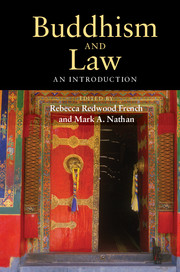Book contents
- Frontmatter
- Dedication
- Contents
- Maps and Illustrations
- Contributors
- Preface
- Abbreviations
- Introducing Buddhism and Law
- Part I The Roots of Buddhism and Law in India
- Part II Buddhism and Law in South and Southeast Asia
- Part III Buddhism and Law in East Asia
- Part IV Buddhism and Law in North Asia and the Himalayan Region
- 17 Buddhism and Law in Tibet
- 18 Buddhist Laws in Mongolia
- 19 Karma, Monastic Law, and Gender Justice
- 20 Buddhism and Constitutions in Bhutan
- A Selection of Readings
- Index
- References
19 - Karma, Monastic Law, and Gender Justice
Published online by Cambridge University Press: 05 August 2014
- Frontmatter
- Dedication
- Contents
- Maps and Illustrations
- Contributors
- Preface
- Abbreviations
- Introducing Buddhism and Law
- Part I The Roots of Buddhism and Law in India
- Part II Buddhism and Law in South and Southeast Asia
- Part III Buddhism and Law in East Asia
- Part IV Buddhism and Law in North Asia and the Himalayan Region
- 17 Buddhism and Law in Tibet
- 18 Buddhist Laws in Mongolia
- 19 Karma, Monastic Law, and Gender Justice
- 20 Buddhism and Constitutions in Bhutan
- A Selection of Readings
- Index
- References
Summary
This chapter investigates the theory of karma, its relationship to the monastic legal system (Vinaya), and the consequences that misinterpreting and unjustly applying the theory in gender relations has for women, particularly with respect to the issue of higher ordination for women.
The theory of karma is basic to an understanding of law for any individual in a Buddhist society, and it undergirds a community’s understanding of the results of legal actions in this and the next life. The Buddha Śākyamuni rejected a deterministic interpretation of karma, instead emphasizing individual responsibility, intention, and the primary importance of actions created in the present moment. As the first part of this chapter will demonstrate, the fundamental Buddhist concepts of cause and effect, rebirth, and suffering are all central to an understanding of the Buddhist legal worldview.
The section on gender relations and women begins with the insight that over time, many Buddhists have come to assume that being born a woman represents a lower status and a lesser spiritual potential. The stereotype of a female rebirth as lower than a male has historically resulted in discriminatory attitudes toward women and has been correlated with obstacles to women’s education and ordination. This rests on the presumption that women are more suited to devotion than philosophy, teaching, and religious leadership. Yet exclusion and fixed conceptions sit uneasily with Buddhist egalitarian ideals and fundamental teachings on dukkha (dissatisfaction), anitya (change), and anātman (no inherent identity). Using the theory of karma to justify gender bias and exploitation is a travesty against the Buddha’s teachings on cause and effect. A careful rethinking of the law of cause and effect, its application to monastic law, and its implications for gender justice and human rights is imperative if the liberating promise of the Buddhist path is to be realized, especially by women.
- Type
- Chapter
- Information
- Buddhism and LawAn Introduction, pp. 334 - 349Publisher: Cambridge University PressPrint publication year: 2014



